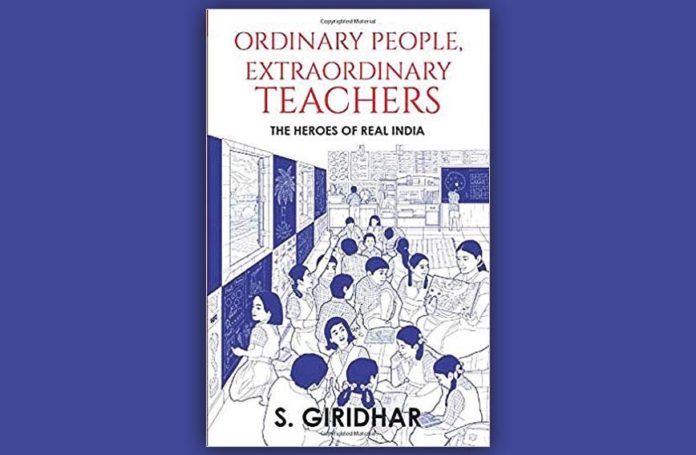Sravanthi Challapalli
The stories in this book are not fiction and the protagonists are heroes and heroines. Ordinary People,
Extraordinary Teachers is a celebration of teachers in rural government schools who go several extra
miles to educate their students despite facing various challenges that range from lack of resources to difficult terrain to local politics, to mention just a few.
The author, S Giridhar, is the Chief Operating Officer of the Azim Premji Foundation which works with government schools to help teachers improve their capabilities. The foundation has also helped set up Voluntary Teacher Forums and Teaching Learning Centres where teachers share resources to enhance their skills in subject teaching and pedagogy as well as learn how to attain other teaching goals. The material for the book is gathered from visits to schools perceived as good institutions in select areas of Uttarakhand, Rajasthan and Karnataka.
Key to these schools’ success is how teachers have managed to make parents their collaborators in
getting the children to come to school. Alongside, they have also raised the profile of their government school through their efforts to lure children away from private institutions on which the parents were spending money they barely had. In the process, several of these teachers have stayed away from their families, moved homes and spent money on supplies and facilities for the students’ benefit – books, stationery, excursions, and indeed, hiring extra teachers and building toilets and classrooms.
Reading about how some teachers achieved their goals is a study in strategy. Some teachers found it
useful to encourage siblings to attend the school together – the older child would be motivated and
the younger one would develop an affinity for education. Some have appealed to community sensibilities by conducting events that would make its members feel valued. For many teachers, the morning assembly has become a valuable tool to set the stage for goals and expectations. Many keep in touch with the children outside school so that they are more relaxed and forthcoming. One prepares
motivational videos to show his students how children who started off in a weak position became competent over time.
Teaching methods are not hidebound, either. In a Rajasthan school, for instance, the teacher learnt Marwari, the local language, to be able to communicate better with his students. If a student cannot
express something in Hindi, the medium of instruction, he/she is free to use a Marwari word. Teachers tell stories, sing, act and involve the children in activities that fuse practical learning with bookish knowledge.
Common to these teachers is the desire to improve their teaching skills and learning as well. Many of the teachers featured in this book started working soon after their Intermediate course and went on to pursue higher education on the job. Some of them worked at other jobs – including driving a taxi and working in a textile mill – before shifting to teaching. Many maintain journals of their teaching experience to track their progress and better their techniques and other teachers can benefit from these rich funds of knowledge, the author notes.
The book notes that many of these teachers started out as ordinary individuals who chose teaching for the same reasons that others choose other jobs – security, stability, respectability, a decent salary.
Some strayed into the profession and stayed put after seeing the difference they could make. Some
evolved into these exceptional individuals over time.
The book also discusses other motivations for the teachers to go above and beyond the call of duty.
(Many of them believe their duty is not limited by the school bell, it should be mentioned.) One is that
as adults, it is natural to care for children; the other is that they are aware that good education can
transform their lives.
The books calls for major improvements in the working conditions of teachers, such as functional toilets, equity in pay and service conditions, opportunities for professional development. It also urges that teachers be allowed to focus on their teaching and their wards, and not be coopted to work in local elections and surveys. The book busts many myths about teachers in government service – that they are uninspired, lazy or absent.
Ordinary People, Extraordinary Teachers is full of heart-warming accounts of real people who work
tirelessly. If you are looking for a big dose of inspiration and positivity, this is the book to pick up.







